
Choking hazard - the link between air pollution and health
The drive to lower emissions has been focused on slowing global warming. The impact of emissions - which are really pollutants - on our health is as important.
Summary: There is a link between air pollution and our health. There are both direct and indirect impacts on health and our bodies are affected in ways that we are beginning to understand. We look at how it impacts our skin, eyes, respiratory disease, lung cancer, cardiac incidence, dementia, breast cancer, fertility and childbirth.
Why this is important: Global excess mortality from all ambient air pollution was between 7.11 and 10.41 million per year. In addition it was estimated to lower life expectancy by between 2.3 and 3.5 years - more than from smoking tobacco.
The big theme: Air quality in general, and pollution in particular, have various significant investment and decision-making implications. Air pollution can be both naturally occurring or produced by human activity. Decreasing pollution with the aim of reducing human illness and suffering should be a goal unto itself. In practice it is also important to consider how such initiatives, that more often than not increase costs and dig into profits, will be beneficial to business and society in the long run, whether it be through decreased healthcare costs, increased health and productivity of the workforce, and reputational gains for such decisions.

The details
The link between ambient air pollution and life expectancy has been well documented. For example, in a 2020 study conducted by the Max Planck Institute for Chemistry it was estimated that global excess mortality from all ambient air pollution was between 7.11 and 10.41 million per year. In addition it was estimated to lower life expectancy by between 2.3 and 3.5 years - more than from smoking tobacco.
It is also clear that we, or at least the authorities, can take actions to reduce air pollution, improve air quality and ultimately reduce that mortality.
Air quality in Beijing had been the biggest concern for the International Olympic Committee during the bidding process for the 2008 Summer Olympic Games and so the authorities in Beijing put in place stringent policies to reduce local and regional emissions in the Beijing metropolitan area including reducing traffic, shutting down polluting factories and suspending large-scale construction projects. The result? Monthly PM10 concentrations in Beijing dropped by roughly 30%.
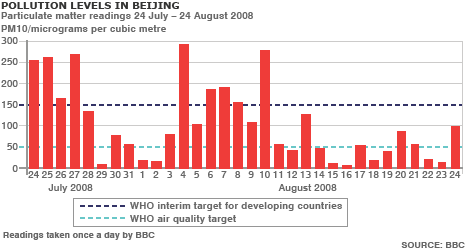
Researchers were able to analyse data before, during and after the games to get an estimate of the effects of PM10 pollution in particular on the cause of death. The greatest effects were in children under 10-years old and in adults aged over 75 years. Men and women were found to be equally susceptible to air pollution risks. They found that a 10% decrease in PM10 concentration reduced the monthly standardised all-cause mortality rate by 8%.
To put that into perspective, the study's authors calculated that 285,000 premature deaths in urban China could be averted annually if PM10 concentrations were reduced by 10%.
There are direct impacts on health which we shall focus on in this Deep Dive. Air pollution can exacerbate symptoms of disease and cause diseases and conditions itself.
There are also indirect impacts on health. Air pollution can contribute to climate change which in turn can produce rising sea levels, flood, drought and other adverse weather conditions. These can impact food and water security as well as bring new harmful microbes into contact with humans.
So air pollution has an impact on our health and can potentially kill us.
Let's first look at what we actually mean by air pollution and the sorts of things it comprises.
What is air pollution?
Air pollution is the presence or release of a harmful substance in the air. Air is comprised mostly of nitrogen (about 78 percent), oxygen (about 21 percent) and small amounts of other gases including carbon dioxide. Pollutants are things that shouldn't normally comprise air and can be a mixture of both solid particles and gases. The most common pollutants are:
PMx = Particulate matter of varying sizes. These are tiny pieces of solids or liquids in the air. the 'x' denotes the average diameter of the particle. PM2.5 particles are 2.5 microns wide or 1/400 of a millimetre. For comparison, the average human hair is 24 times wider. PM2.5 is more likely to get into and deposit on the surface of the deeper parts of the lung. They can cause breathing difficulties but also a causal link to lung cancer has been found. PM10 are bigger at 10 microns wide and more like typical dust, irritating eyes, nose and throat.
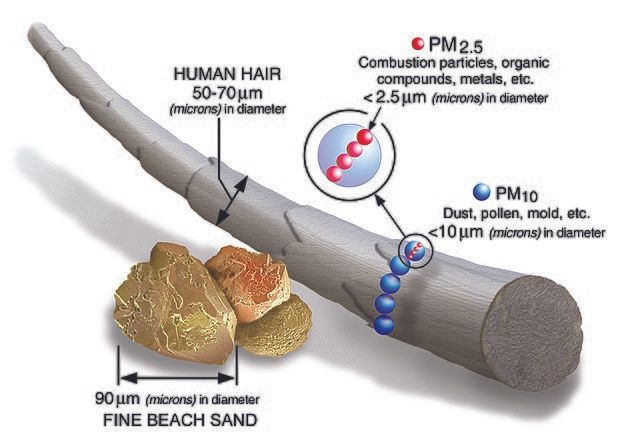
NOx = Nitrous oxides typically a catch-all for nitric oxide (chemical symbol NO) which is odourless and colourless and nitrogen dioxide (NO2) which has a sharp smell and is a reddish-brown colour. NO reacts with ozone in the air to form NO2. Low levels can cause irritation, coughing, shortness of breath and nausea with consistent exposure over a few days leading to fluid build-up in the lungs. Combustion in air (e.g. burning fuels) will produce NOx.
Carbon monoxide = This is a colourless and odourless gas produced when fossil fuels are burned incompletely. The chemical symbol is CO. The biggest source in air pollution is from Internal Combustion Engine (ICE) vehicles. Once in the bloodstream, CO can make it difficult for the body's cells to bind to oxygen and that lack of oxygen causes breathing difficulties, flu like systems and can be fatal.
SO2 = Sulphur dioxide is a colourless gas, which is very soluble in water and corrosive. It is released during volcanic eruptions but its main man-made source is from burning fossil fuels. Toxic when inhaled.
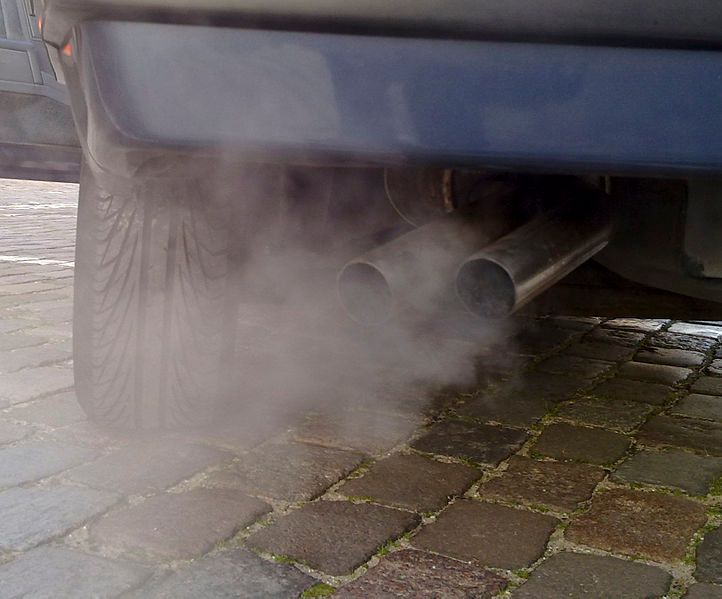
Ozone = Ozone is a gas whose molecules are made up of three oxygen atoms (O3), rather than the normal two that we find in oxygen gas (O2). The 'Ozone layer' in the upper atmosphere protects us by absorbing most of the Sun's UV radiation. However, when ozone forms at ground level it can trigger asthma and reduce lung function. O3 can form when sunlight interacts with pollutants such as NOx, carbon monoxide and volatile organic compounds.
VOC = 'Volatile Organic Compounds'. These are gases emitted from products and processes that can be harmful themselves or can react with other gases to form pollutants (see Ozone above). Examples include benzene, formaldehyde and toluene and sources include some solvents (e.g. paint, varnish, paint stripper), fuels, pesticides and disinfectants. As well as causing respiratory problems, they can also cause cancer.
PFAS = 'Perfluoroalkyl' and 'polyfluoroalkyl' substances. These are man-made chemicals, often referred to as 'forever chemicals' because they don't break down naturally in the environment sure to their strong carbon-fluorine bonds. Examples of their use are in the nonstick coatings for cookware. Air emissions of PFAS are mostly from industrial sources, but can also get into the air from landfills and wastewater treatment plants. Pesticides are another source of PFAS as we discussed in this Perspective 👇🏾

How air pollution impacts us
We have already discussed how air pollution impacts mortality. Let's look at how it specifically impacts our health.
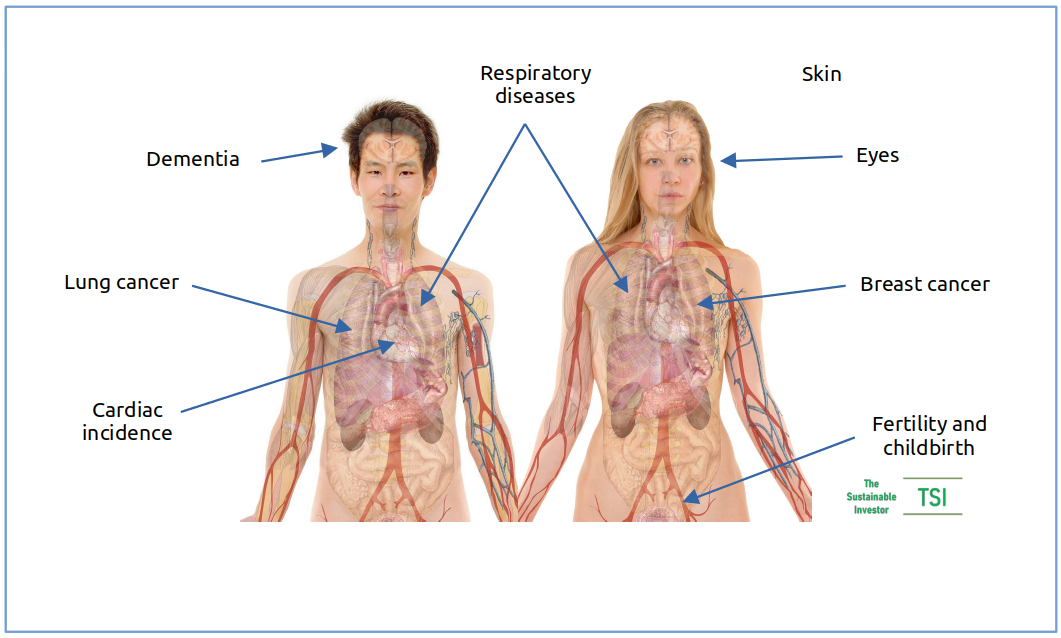
Respiratory diseases
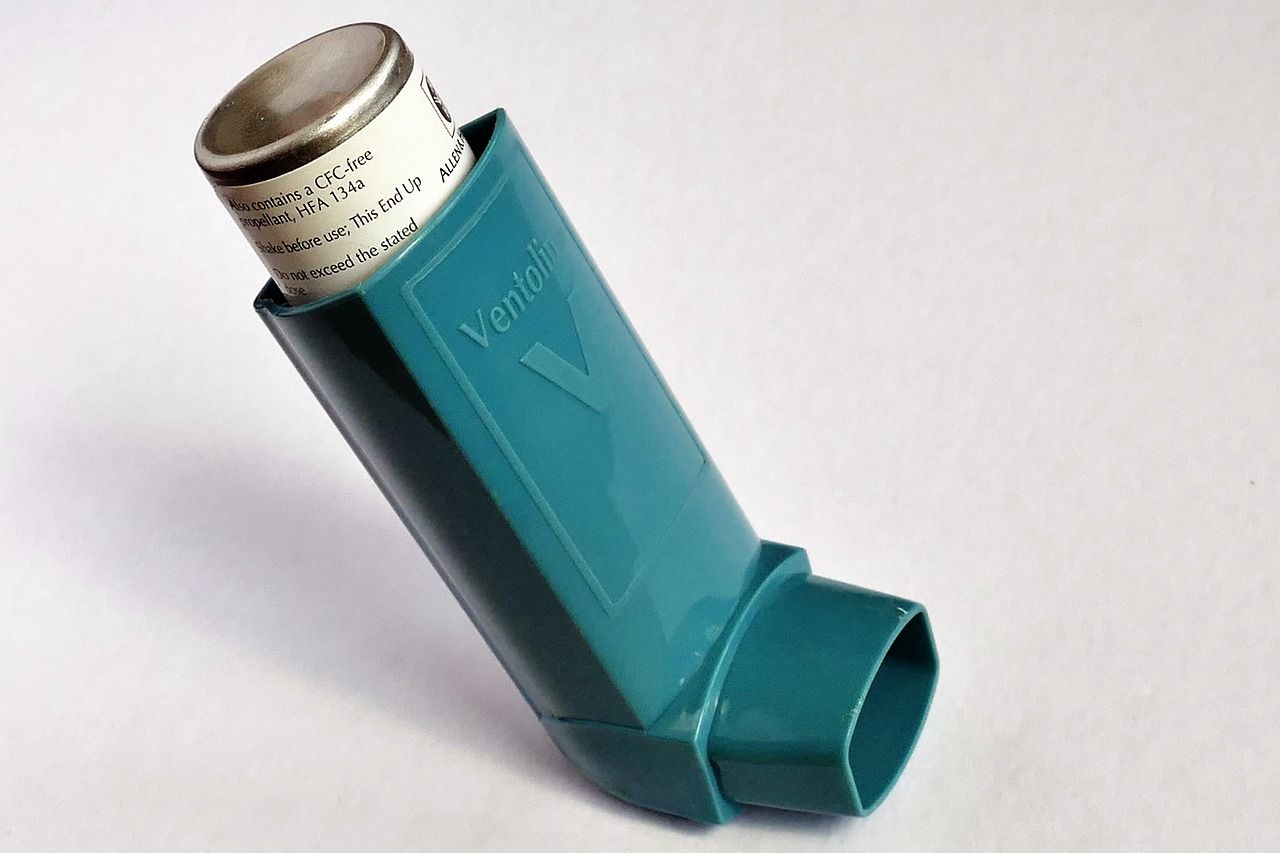
Difficulty breathing is perhaps the thing that most people associate with air pollution. Air pollutants can irritate airways, causing shortness of breath, coughing, wheezing, asthma episodes and chest pain.
Although our airways and lungs have protective mucus, PM10 particles can still cause irritation. However, the small PM2.5 particles can get through and make their way into the bloodstream.
Air pollution can make respiratory infections much worse, particularly in children. Various acute respiratory infections are together responsible for nearly a third of all deaths in children under 5 years old.
Research has also shown that air pollution can worsen asthma symptoms, particularly in overweight or obese children.
Eyes
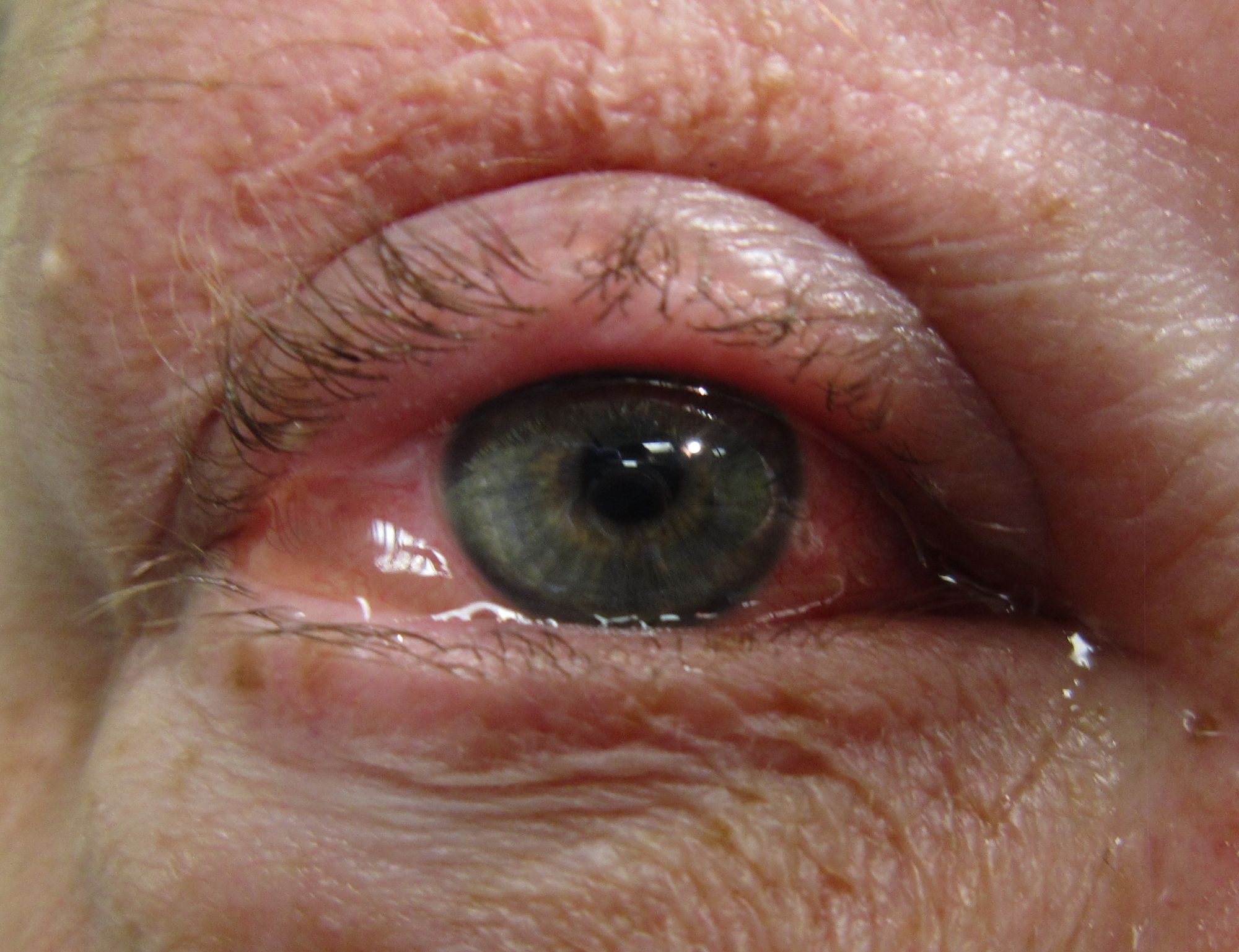
Exposure to air pollution has proven to be harmful to human eyes. The type of resulting eye condition varies depending on whether the pollution is outdoor or indoor which includes from tobacco smoking, cooking exacerbated by poor ventilation.
A 2021 study found that outdoor pollution can lead to ocular surface disease (including things like allergic conjunctivitis shown in the image above), glaucoma (typified by pressure in the eye) and retinopathy (issues with the retina). In addition to these, indoor pollution can also cause cataracts (cloudiness over the lens) and uveitis (inflammation inside the eye).
Another study by researchers from University College London found a link between air pollution and age related macular degeneration (AMD). This is progressive and the leading cause of irreversible irreversible blindness among people aged over 50 in high-income countries. They found that people exposed to an additional 1 microgram per cubic metre of PM2.5 had an 8% higher risk of AMD.
Skin

Although our skin acts as a biological shield against air pollutants, prolonged or repetitive exposure to high levels of them can damage it. It is thought that it reduces the amount of antioxidants in the skin allowing a build up of free radicals that cause 'oxidative stress' - cell damage and inflammation.
Some autoimmune skin diseases such as psoriasis or eczema appear to be a product of genetics and environmental triggers such as air pollution. One study found that the mixture of the components of air pollution was particularly telling.
Volatile organic compounds have been found to be associated with atopic dermatitis, particularly in children.
Lung cancer
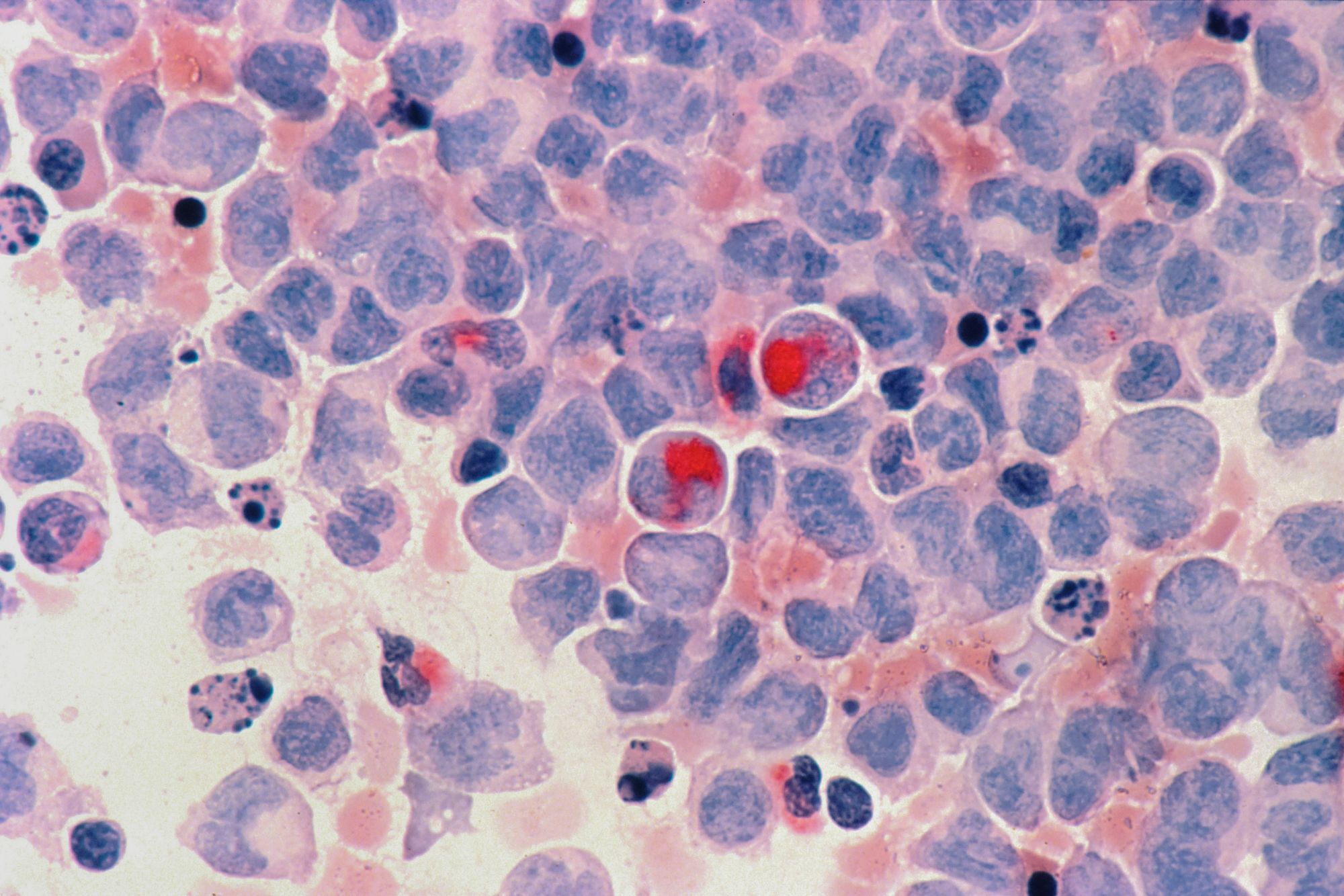
Lung cancer is the second most common cancer globally with more than 2.2 million new cases in 2020 alone. Smoking is the main cause of lung cancer, but non-smokers can also contract the condition.
Scientists from the Francis Crick Institute and UCL, led by Cancer Research UK Chief Clinician Professor Charles Swanton, have revealed how air pollution can cause lung cancer in people who have never smoked. The study examined data from more than 400,000 people and found higher rates of other types of cancers in areas with high levels of fine particulate matter, known as PM2.5.
Globally, about 300,000 lung cancer deaths in 2019 were attributed to exposure to PM2.5 and it is estimated that 1 in 10 cases of lung cancer in the UK are caused by outdoor air pollution.
Inactive cancer-causing mutations that accumulate naturally can be “woken up” by air pollution enabling them to grow and potentially form tumours. The team found that mice with a mutation associated with a particular type of lung cancer (EGFR) that also had air pollution levels of those normally found in cities were more likely to develop cancer than those not exposed.
The mechanism unearthed is that Interleukin-1 beta (IL-1𝛽) is released in response to PM2.5 exposure. The research team found that blocking IL-1𝛽 prevented cancers developing in EGFR mutation-carrying mice.
Breast cancer

Breast cancer is one of the major female health problems globally. In 2020 there were 2.3 million women diagnosed with the condition globally and there were an estimated 685,000 deaths.
A study published in 2020 on the impact of air pollution on breast cancer incidence and mortality in South Korea showed interesting results. They conducted their research nation-wide (across South Korea) using a whole-population census study. Even when accounting for other factors such as smoking and obesity rates, oral contraceptive use and socio-demographic factors such as population density and higher education, the study demonstrated that ambient air pollutant concentrations were positively and significantly associated with the breast cancer incidence rate, although they found no significant association to breast cancer mortality rate.
A French study of 100,000 women with ages ranging from 40 to 65 from 1990 to 2011, found an increased risk of breast cancer associated with long-term exposure to NO2 air pollution.
Cardiac incidence

A study conducted in Singapore suggests that increased PM2.5 concentrations have the potential to cause out-of-hospital cardiac arrests (OHCAs).
Just over 18,000 reported cases of OHCA, between July 2010 and December 2018, were tracked against pollution levels in Singapore. The study claimed that 492 of those cases could be ‘attributed to’ increased concentrations of PM2.5 levels. The researchers claim to ‘have produced clear evidence of a short-term association of PM2.5" with OHCA, although they did recognise that the study was observational and a causal relationship is still speculative at this point. Nevertheless, it still suggests that this is an area worth exploring further.
During the period of the study, daily PM2.5 concentrations averaged at 18.44 micrograms per cubic meter. The researchers modelled hypothetical reductions in PM2.5 levels and found that a 1 microgram per cubic meter drop correlated to an 8% reduction in OHCAs. The effect appeared to be compounding, with a drop of 3 micrograms per cubic meter corresponding to a 30% reduction. That's the equivalent of 39 and 149 fewer heart attacks, respectively. Also encouraging is the short time frame in which results could be seen – heart attack risk dropped in just 3-5 days after exposure, meaning that efforts to reduce such particles (via a decrease in overall air pollution) could have a very quick and positive impact on morbidity and mortality, population health, worker productivity and strain on the healthcare system.
Returning to the Beijing 2008 Summer Olympic Games, researchers from the University of Rochester Medical Center found that...
“As air quality improved during the games in Beijing, markers of key biological pathways associated with cardiovascular disease also improved, demonstrating that – even in healthy young Beijing residents – there are specific mechanistic links between air pollution and cardiovascular health.”
David Q. Rich, Sc.D.,M.P.H. Epidemiologist, University of Rochester
These two different conditions are often mistakenly assumed to be the same thing. They are not.
A heart attack is when one of the coronary arteries becomes blocked stopping blood from getting to the heart muscle. Left untreated that muscle dies as it is not getting enough oxygen.
Cardiac arrest is when the heart actually stops beating and pumping blood around the body. Chest compressions and CPR aren't aimed at restarting the heart but rather to keep blood flowing around the body to keep vital organs alive.
Fertility and childbirth

There is also increasing research into the link between air pollution, male and female fertility, and neonatal health issues such as low birth weight.
Studies have shown that increased exposure to particulate matter decreases ovarian reserves – in other words, accelerates reproductive ageing, lowering egg count, and decreases overall fertility. Men are not immune either, and although studies are less conclusive, there is a growing expectation that male fertility is negatively impacted by fossil fuel pollution.
Furthermore, researchers have gone on to speculate that air pollution may have a multi-generational effect on fertility, with increased air pollution negatively affecting the development of foetal gametes (eggs and sperm), with the effect manifesting once that individual reaches reproductive age.
As the environmental factors that influence a pregnant mother also influence a developing foetus, a link between air pollution and low birth weight has been established in several places around the world. In studies that included pregnant women from across cultural, ethnic and social demographics, all showed a link between increased air particulates and low birth weight of newborns.
Dementia
There are 55 million people with dementia globally and that is expected to rise to almost 153 million people by 2050. The estimated global cost of medical, social and informal care associated with dementia in 2019 was more than US$1.3 trillion with more than half attributable to care provided by informal carers.
It is also a disease that disproportionately impacts women. The female-to-male ratio of people with the dementia is 1.69 and women experience higher disability-adjusted life years (how many years of life expectancy are lost due to early death or years lived with a disability) due to dementia. In addition they are also indirectly impacted as women also provide 70% of care hours for people living with dementia.
Researchers from the Harvard TH Chan School of Public Health (Wilker, Osman and Weisskopf) performed a systematic review of 51 studies and subsequent meta-analysis including 16 of those studies looking at potential links between ambient air pollution and dementia.
Their conclusion was that PM2.5 might be a risk factor for dementia. Interestingly the link between PM2.5 and clinical dementia seemed to exist below the current US Environmental Protection Agency (US EPA) annual standard of 12 mcg / m3 (micrograms per metre cubed) and well below the UK and EU limits of 20 mcg / m3 and 25 mcg / m3 respectively.
Nitrogen dioxide (NO2) and nitrous oxides (NOx) may also be risk factors but less data was available.
We discussed this in more depth in this blog 👇🏾

Sources of air pollution
There are a number of sources of air pollution, some of which we have alluded to already. Let's look at the major sources.
The first is close to home. It is the home! It is estimated that 3.2 million people per year die prematurely from illnesses attributable to household air pollution caused by the incomplete combustion of kerosene and solid fuels (including wood, animal dung and coal) used for cooking. Globally there are still more than 2 billion people using such fuels most of whom are in low- and middle-income countries. Of those 3.2 million deaths, more than 7% were children under the age of 5.
We have previously discussed transportation, in particular road transportation as a major source of man-made air pollution in this blog including the impact of tyre wear from increasingly heavy vehicles including EVs. 👇🏾

Air pollution can be found underground too. Most of the particulate matter on the Underground is created as wheels, tracks and brakes grind against each other and very small metallic particles are thrown up. 👇🏾

A study published in the journal Environmental Research: Health, found that air pollution from the oil and gas sector in the United States has substantial adverse impacts on air quality, human health, and health costs. The study found that air pollution in from the oil and gas sector in the US (from 2016) resulted in 410,000 asthma exacerbations, 2,200 new cases of childhood asthma and 7,500 excess deaths. The cost implications of this were startling.
When monetized, these air quality health impacts of oil and gas production exceeded estimated climate impact costs from methane leakage by a factor of 3.
A big source of air pollution is not man-made at all. Nature also plays its part. In areas such as Africa and West Asia that are close to deserts, windblown dust is a major source. On a trip to visit a car dealership in Beijing in 2013 it was interesting to note that a car washer was employed all day every day to clear dust blown in from the Gobi desert!
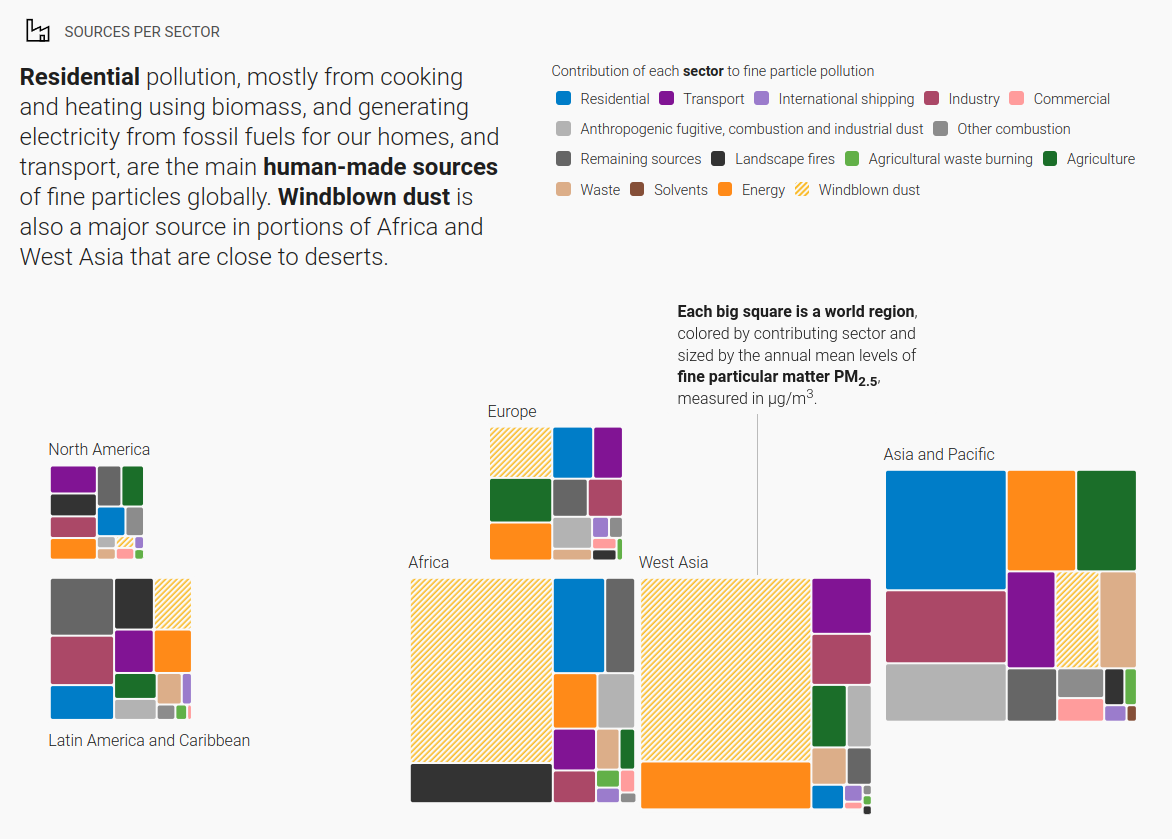
Where you live matters
Lower middle income countries have been found to have the highest mean annual exposure to PM2.5 air pollution.
In 2021, the WHO updated their PM2.5 annual mean air quality guideline to five micrograms per cubic metre. The previous 2005 guideline level was 10 micrograms per cubic metre. This means that in 2019, 99 percent of the world population was living in places where the WHO’s strictest air quality guideline levels were not met.
Conclusion
Air pollution has an impact on our health and ultimately can lead to increased mortality. However, even as our understanding of the mechanisms of this impact increase, so we must realise that there are actions that individuals, corporates and governments can take that will have an immediate positive effect.
Something a little more bespoke?
Get in touch if there is a particular topic you would like us to write on. Just for you.
Contact us
Please read: important legal stuff.


